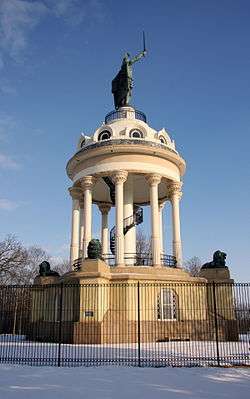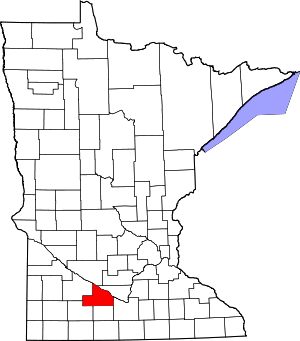Hermann Heights Monument
The Hermann Heights Monument is a statue erected in New Ulm, Minnesota. The statue depicts Hermann the Cheruscan, also known by the Latin name Arminius, but locals refer to the statue as Hermann The German. The only National Register of Historic Places property of its kind in Minnesota, the monument remains an impressive remembrance of Deutsch Germanic ancestry for many Minnesotans and other German Americans. Visitors to the statue can climb the spiral staircase to an observation platform at the base of the statue, which commands a view of the town and the Minnesota River Valley below.
Hermann Monument | |
 Hermann Heights Monument in 2013 | |
  | |
| Location | Hermann Heights Park, New Ulm, Minnesota |
|---|---|
| Coordinates | 44°18′25.52″N 94°28′21.47″W |
| Built | 1888–1897 |
| Architect | Julius Berndt |
| Sculptor | Alfonz Pelzer |
| NRHP reference No. | 73000965[1] |
| Added to NRHP | October 2, 1973 |
Significance
This statue commemorates the German victory over the Romans at the Battle of the Teutoburg Forest, a symbol of German patriotism.
While Arminius had been known about in Germany since the rediscovery of the writings of Tacitus in the 15th century, German Protestant intellectuals in the first half of the 18th century christened him "Hermann Deutsch" and promoted his status from that of a local tribal leader with family ties to Rome to that of a hero of Alemmani resistance to "Roman" (i.e. Papal) authority; the 19th century added another layer of meaning, namely Pan-German unity and resistance to Revolutionary France and her language.[2] As depicted in this statue, Hermann's eastward gaze and upraised sword signify freedom from Rome. Perhaps not coincidentally, a statue of St. Paul atop the nearby Roman Catholic Cathedral of the Holy Trinity also gazes eastward, with his sword point-down, planted firmly in the ground.
Characteristics
The Hermann Monument has a total height of approximately 102 feet (31 m). Constructed of sheet copper molded over iron, the 27 feet (8.2 m) statue stands on a 70 feet (21 m) iron column encircled by a spiral staircase to the dome, which is supported by 10 iron columns and a Kasota stone base.
History
Following the completion of the similarly commemorative Hermannsdenkmal statue in Detmold, Germany, in 1875, the Germanic-American fraternal order of the Sons of Hermann, under the leadership of Julius Berndt, who headed the New Ulm chapter and was then national secretary of the order, paid for the erection of the American monument.[3] Berndt designed the monument setting, for which the cornerstone was laid in 1888.[4] The statue was created by Alfonz Pelzer of the W. H. Mullins Manufacturing Company in Salem, Ohio[5] and shipped to New Ulm. It arrived in 1890 and was dedicated in 1897. Structural and cosmetic restoration projects were carried out in 1998 and again in 2004.
The Hermann Heights Monument was added to the National Register of Historic Places in 1973. It is the third largest copper statue in the United States after the Statue of Liberty and the "Portlandia" in Portland, Oregon.
The 106th United States Congress (2000) designated the Hermann Monument in New Ulm to be an official symbol of all citizens of "Germanic" heritage.[4][6]
In August 2009, a small fire at the base of the monument caused officials to question the structural integrity of the monument. As of this time, the monument remains open to the public.
References
- "National Register Information System". National Register of Historic Places. National Park Service. January 23, 2007.
- Down from Olympus: Archaeology and Philhellenism in Germany, 1750–1970 by Suzanne L. Marchand, Princeton University Press.
- Germany and the Americas: Culture, Politics, and History, ed. Thomas Adam, ABC-CLIO, 2005, ISBN 1-85109-628-0 pp. 985–86 .
- Hermann on the Prairie, City of New Ulm, Minnesota, retrieved April 25, 2011.
- Harris, Moira F., Monumental Minnesota: A Guide to Outdoor Sculpture, Pogo Press, 1992, p. 5.
- In 2011, placement at the monument was authorized of a rock engraved with the words "The 106th Congress of the United States of America designates the Hermann Monument in New Ulm, Minnesota as an official symbol recognizing the great contribution by Americans of German Heritage A.D. 2000.": Josh Moniz, "Commission OKs Hermann archway, rock monument," The Journal (New Ulm) March 22, 2011.
External links
| Wikimedia Commons has media related to Hermann Heights Monument. |
